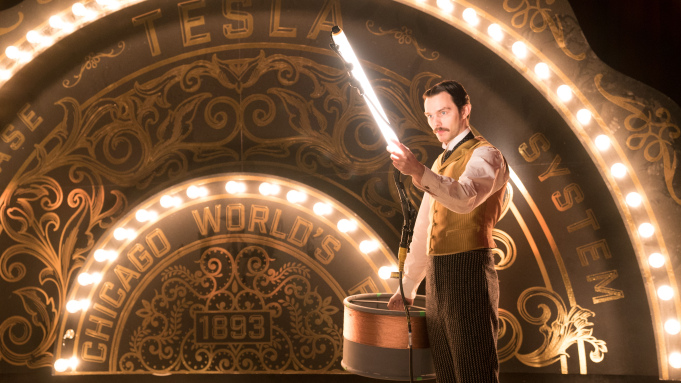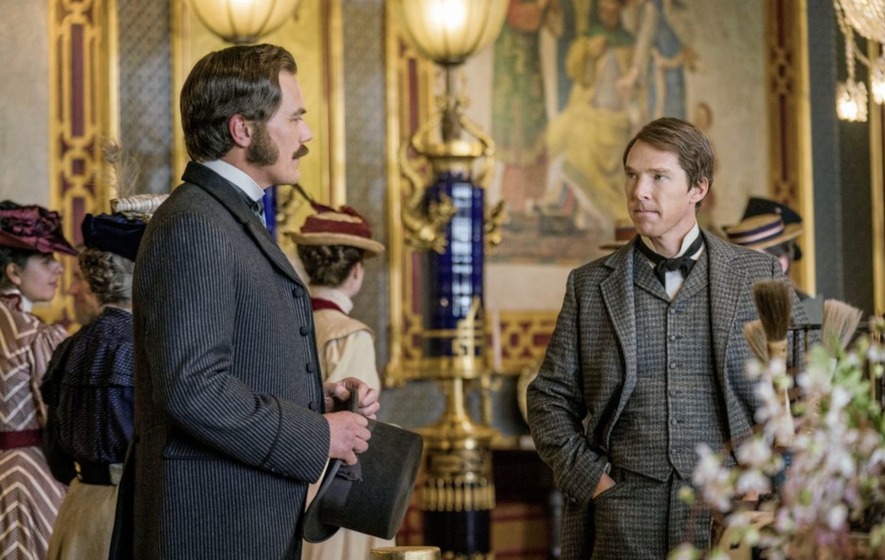The Current War (2019)

DIRECTOR: Alfonso Gomez-Rejon
CAST: Benedict Cumberbatch, Michael Shannon, Nicholas Hoult, Tom Holland, Katherine Waterston, Matthew Macfadyen, Tuppence Middleton
REVIEW:
Filmed in December 2016 and originally slated for a 2017 release, The Current War has finally found its way into theaters two years later after becoming collateral damage of the Harvey Weinstein sex scandal and the subsequent downfall of The Weinstein Company (after the beleaguered Weinstein Company sold off The Current War‘s film rights, they were eventually bought by little-known 101 Studios). This finally released version comes out under the label “The Director’s Cut”, claiming it represents director Alfonso Gomez-Rejon’s original vision before Harvey Weinstein got his hands on it and, as was notoriously his wont, started chopping and editing (this is supposedly the original version which played at the Toronto Film Festival in 2017, not Weinstein’s edit, which was never released). In retrospect, the film’s turbulent and meandering behind-the-scenes journey to its low-profile delayed theatrical release might have been a more eventful story than the film itself. A movie about the fledgling electrical grid and the men vying for dominance over it is not inherently cinematic, and no matter much director Alfonso Gomez-Rejon tries to spice it up with visual flair, The Current War remains a rather drab history lesson that fails to use a promising cast to its full advantage.
The film spans events from 1880 to 1893, centering on the competition between Thomas Edison (Benedict Cumberbatch) and George Westinghouse (Michael Shannon) for supremacy of the new electrical power market. Edison is a genius and Westinghouse is not, but with Edison’s brilliance comes arrogance and recklessness that makes investors jittery, especially when he sucks up vast sums of money and is slow to show results. Westinghouse boasts to investors that his system is both cheaper and more reliable, but Edison is both more publicity-savvy, and more willing to use unscrupulous methods. He perpetuates unfounded fear-mongering claims that Westinghouse’s system will electrocute people, then when pressed for evidence uses some unfortunate animals as demonstrations. This leads to Edison having a reluctant hand in the invention of the electric chair as a new, “more humane” form of capital punishment, with Edison compromising his own principles and his earlier vow to never allow his technology to be used for harmful purposes to hurt Westinghouse’s public image by negotiating to have Westinghouse’s name slapped front-and-center on the electric chair and keep his own name out of it. Initially, Westinghouse stoically ignores Edison’s smears, but eventually resorts to using his own press connections to expose Edison’s behind-the-scenes role in the electric chair’s creation. The two men’s contest comes to a head when they vie for the contract to light up the Chicago World’s Fair (the 1893 Columbian Exposition — the one with the H.H. Holmes murders, although that’s not mentioned here). And meanwhile, there is a “wild card” of sorts in the form of Serbian-born young inventor Nikola Tesla (Nicholas Hoult), who works for Edison first, strikes out on his own when he feels unappreciated, and eventually attracts Westinghouse’s attention.
The biggest problems with The Current War, besides its inherently non-cinematic subject matter, are lack of character development and lack of excitement. While there is some intrigue in the back and forth maneuvering, the movie doesn’t do a good job of getting us emotionally invested, and part of the reason, aside from everyone being poorly-developed, is that Edison and Westinghouse only cross swords indirectly from afar or through others. Benedict Cumberbatch and Michael Shannon only share the screen twice, once a brief silent staredown, then a mostly civil conversation at the end of the movie, which isn’t cutting it for building up any kind of excitement or intensity in their rivalry, and doubly disappointing that actors like Cumberbatch and Shannon, both of whom are capable of forceful presences, don’t get even one scene to square off in a juicy confrontation. In fact, some side subplots like Edison’s reluctant hand in the invention of the electric chair threaten to be more interesting than the central conflict.
Character development is spotty; characters are introduced, events zip by, and the thirteen-year passage of time is whizzed through so rapid-fire that it has a fragmented, abridged, scattershot feel (additionally, in all those thirteen years, the boyish Nicholas Hoult and the even more boyish Tom Holland don’t seem to age at all, apart from the movie eventually slapping a mustache on Holland that’s a little hard to take seriously). Events like the death of Edison’s wife (Tuppence Middleton) go by too fast to generate any emotional effect and feels more like a footnote than an important character moment (Edison later remarried to a woman he spent the rest of his life with, but the movie completely leaves her out), and if Edison’s character development is haphazard, everyone not named Edison fares even worse. Additionally, the movie sometimes gets overly bogged-down in technical details; average audience members aren’t going to know or care about the difference between Edison’s DC (direct current) and Westinghouse’s AC (alternating current), or why Westinghouse’s is better for long distances. Too often, The Current War feels like a dry history lesson, and a rushed, abridged, Cliff Notes skim-through, at that.

Alfonso Gomez-Rejon does his best to imbue the film with a restless energy, employing swooping camera shots, fast cuts, and tilted angles in an attempt to pull out all the visual stops to make this seem cinematic and exciting, but his efforts are only partially successful. Technical details are fine, everyone looks good in their period wardrobes, and the movie is at times visually striking, but there’s only so much surface elements can do to pump up the action when the subject matter is so drably underplayed that it falls flat even when it superficially looks pretty.

The acting is a notch above adequate but a notch below anything really special despite a nice line-up. Benedict Cumberbatch is fine, but he plays Thomas Edison as just another in his filmography of abrasive geniuses. File him alongside Sherlock Holmes, The Imitation Game‘s Alan Turing, and Doctor Strange. Cumberbatch gets a bit typecast as these kinds of characters because he’s good at them, but he could play this part in his sleep. Meanwhile, Michael Shannon seems muted. Shannon is at his best as intense, high-pressure characters and here feels hamstrung and having all energy sapped out of him by being stuck in a stoic, reserved personality. Westinghouse is, on principle, arguably more sympathetic than Edison, but his dour demeanor leaves the more flamboyant Edison more engaging as a character. Nicholas Hoult is suitably off-kilter as the eccentric, debonair Tesla, but the character only pops up sporadically and is underused and poorly-developed, leaving him feeling like an incomplete third wheel. There could have been real poignancy in Tesla’s story of an idealistic inventor, a visionary genius with technology but out of his depth as a businessman (he eventually died impoverished and alone, not to receive recognition until long after his death), but nothing of substance is done with this. Tom Holland (who filmed this shortly before again co-starring with Benedict Cumberbatch in The Avengers: Infinity War), as Edison’s young secretary/assistant Samuel Insull who is loyal to Edison but not without some misgivings about his methods, gets one noteworthy confrontation with Cumberbatch in an otherwise mostly thankless role that doesn’t give him much to do. Katherine Waterston as Westinghouse’s supportive wife and Matthew Macfadyen as banking mogul J.P. Morgan, who alternately bankrolls Edison and Westinghouse in turn, don’t get much to do, and Tuppence Middleton as Edison’s wife gets even less.
It’s hard to say whether subject matter as inherently unexciting as the competition to corner the burgeoning electrical power market could have made a more compelling movie in different hands, but one might reasonably have expected something a little more from the cast onhand. Ultimately, The Current War feels like little more than a skimmed through history lesson, and one needn’t pay for a movie ticket for that.
* *1/2